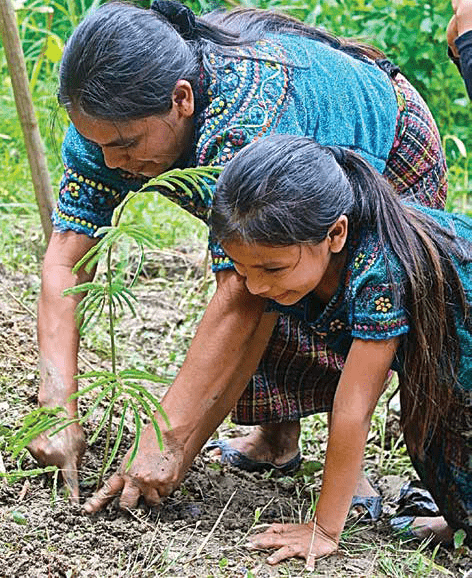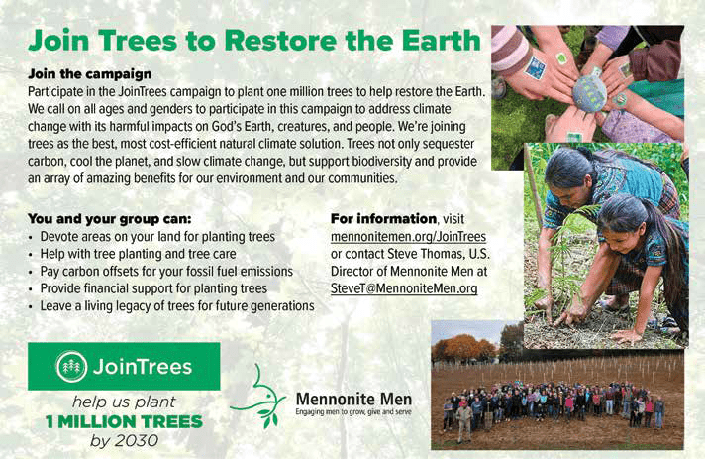This article first appeared in the August 26, 2022 issue of Anabaptist World.
To cool the planet, plant a tree. Together we can plant a million.
As a child, I loved being in nature. While I don’t recall what I noticed one day, I remember feeling
worried. I wrote a message, placed it in a corked bottle and floated it down the creek.
My message?
“God save the Earth.”
As climate change worsens, many people make this prayer. I now realize, however, that God doesn’t answer prayers like this while we stand by and wait. God answers our prayers with our cooperation.
As St. Teresa of Avila said, “Christ has no body now but yours. No hands, no feet on Earth but yours.”

God wants to cooperate with our own actions to answer our prayers. Yes, we may pray, but we must act. And now.
We see in the news people suffering the loss of their homes, food supply or clean water. All of this is projected to worsen as extreme heat, storms,
flooding, fires and droughts increase in frequency and intensity with climate change.
The last report of the United Nations’ Intergovernmental Panel on Climate Change is disheartening. It finds climate change is widespread, rapid and intensifying. These changes will lead to humanitarian crises — food in- security, scarce resources, health issues and other population stresses.
And, according to last year’s report of the National Security, Military and Intelligence Panel on Climate Change, these conditions will contribute to political insecurity — increasing conflicts, violence and mass migrations.
As followers of Jesus, we must respond. But we often don’t act until we experience the problem or feel the heat.
In Indiana, I’m rather insulated from these impacts. What really gets my attention is our grandchild, Lily.
Around the time of her birth, I read in The New Yorker: “If you’re younger than 60, you have a good chance of witnessing the radical destabilization of life on Earth — massive crop failures, apocalyptic fires, imploding economies, epic flooding, hundreds of millions of refugees fleeing regions made uninhabitable by extreme heat or permanent drought. If you’re under 30, you’re all but guaranteed to witness it.”
I worry about our grandchildren and all God’s creatures. I imagine our grandchildren asking two questions about climate change: “Did you know? What did you do?” I hope to answer with, “Yes, I knew about global warming, and here’s what we did about it…”
I’m worried, but hopeful enough to act.
What can we do? We must use less fossil fuel, turn to renewable energy and adjust our diet, to name a few ac- tions. Protecting forests and planting trees are also among the most critical actions we must take.
As the best means to sequester carbon dioxide, trees are the most essential natural solution to mitigate global warming. With their unparalleled capacity to capture and store carbon, protecting and increasing tree cover are front-line actions to mitigate catastrophic climate change.
And yet, global tree-cover loss continues at a rate of 11.6 million acres per year, adding to the 46% loss of the Earth’s tree cover since humans began clearing land and logging.

Annual per capita wood consump- tion in the United States is 640 pounds — equal to a white pine tree 43 feet tall, one foot in diameter. With decreasing forest cover and increasing carbon emissions, rising temperatures will continue to create greater crises.
Mennonite Men, the men’s organization of Mennonite Church USA and Mennonite Church Canada, is responding to this global crisis with our JoinTrees campaign to plant one million trees.
The campaign is rooted in biblical wisdom and scientific knowledge, with the aim to restore the Earth.
The first and last chapters of the Bible feature trees of life, revealing their importance in God’s design for the Earth. The woodland garden of Eden in Genesis represents what its Creator intended on Earth: beauty, biodiversity and abundance, where trees give life with God. The last chapter of Revelation presents the tree of life again as a central part of the new Earth for healing.
In Genesis 2:15 we read that God put the human creature in the garden to serve and protect it as its steward. This stewardship includes planting, tending and protecting trees so they may serve their critical role in the ecology of God’s creation.
A Jewish midrash (ancient commentary on Scripture) says that after God made the first human, God led him around all the trees of the Garden of Eden and said, “See my works, how beautiful and praiseworthy they are. Be careful not to spoil or destroy my world, for if you do, there will be nobody after you to repair it.”
Ancient wisdom recognized the importance of trees, as does modern science. Trees have benefits far beyond beauty, shade, wood and food.
Trees capture and store carbon, cool the planet and moderate the climate. Trees improve water and air quality and stabilize soil. Trees support biodiversity, which is endangered, by providing food and shelter.
Trees reduce storm water runoff, cool urban heat centers and curb energy use. Trees promote commu- nity interaction and reduce aggres- sion and crime. Trees have personal health benefits.
Trees provide a great return on investment. According to iTree (based on USDA Forest Service research), each $1 invested in urban trees returns $3.93 in Goshen, Ind., $6.09 in Indianapolis and $5.80 in New York City.
While all these benefits are significant, our JoinTrees campaign focuses on establishing trees as a natural solution to mitigate global warming. The campaign involves planting trees on private, business and church properties, marginal farmland set aside for afforestation, public rights-of-way and interna- tional projects.
We especially focus on large-scale tree planting and agroforestry in the Global South, where trees have the greatest impact to cool the planet, restore degraded land and support vulnerable populations.
We call on communities of faith to participate in JoinTrees. People can:
- Plant trees and report these to us.
- Devote land for afforestation projects.
- Help with planting and caring for trees.
- Provide financial support for planting trees.
- Make carbon-offset contributions to JoinTrees.
People are looking for ways to be carbon-neutral or carbon-positive for the good of God’s Earth and future generations. Individuals, churches, schools and businesses can calculate their carbon use with the Center for Sustainable Climate Solutions’ Carbon Tax Calculator (sustainableclimatesolutions.org/carbon-tax-calculator-full) and submit carbon-offset contributions for large-scale tree projects to JoinTrees. For this and to participate in this campaign, go to mennonitemen.org/jointrees.
Thanks to strong participation and support, since our campaign began in 2020, nearly 90,000 trees have been planted or funded. And we have pro- posals to plant at least 34,000 more trees in our next grant cycle.
Let’s take action with God to answer prayers to save the Earth. Let’s do our part for a healthy, thriving planet.
Steve Thomas is the U.S. director for Mennonite Men. A certified arborist and graduate student in urban forestry, he is coordinating the JoinTrees campaign to plant one million trees with the larger church.

